Harnessing AI for Social Impact
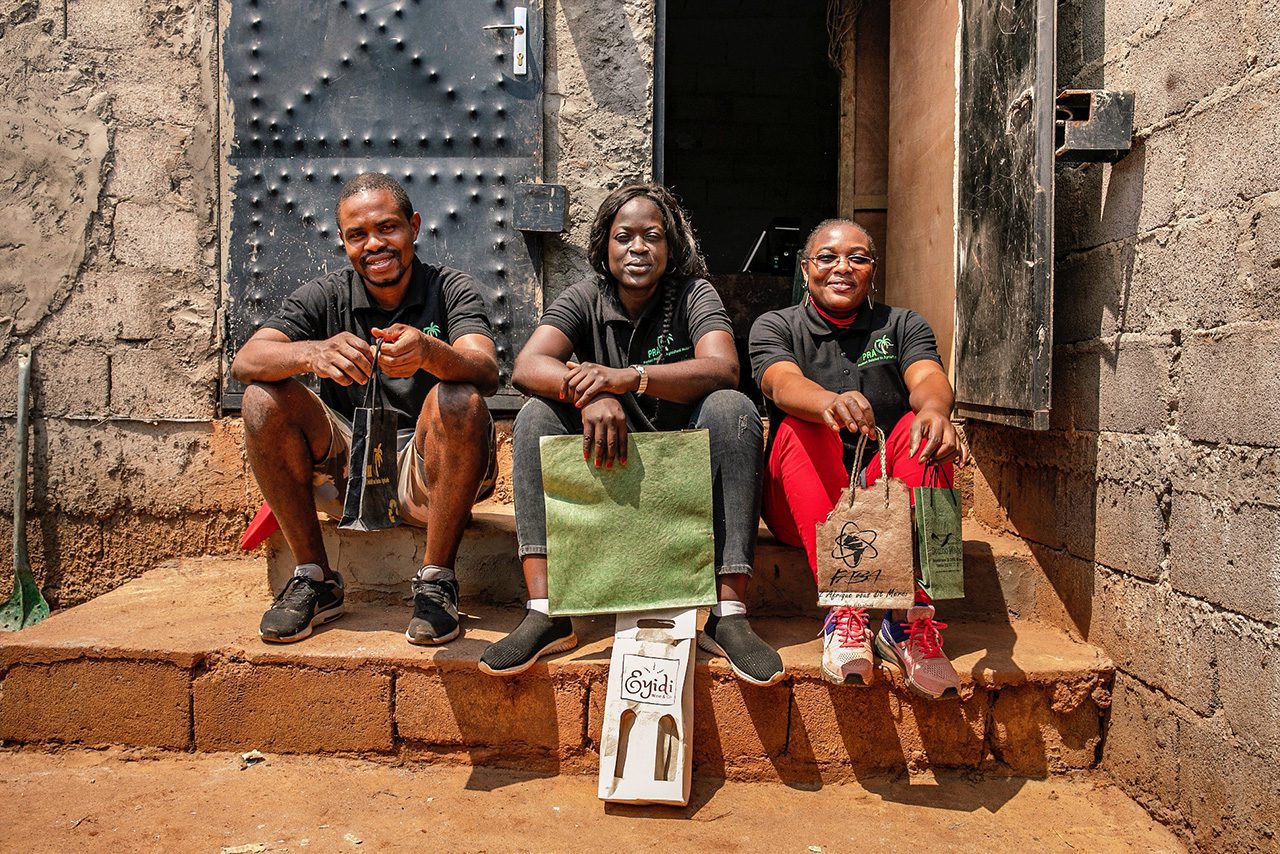
Finding innovative solutions to address the imminent social and environmental issues outlined in the United Nations’ list of Sustainable Development Goals (SDGs) is vital.
The SDGs are characterized by three key elements: universality, meaning that they apply to every nation and sector; integration, meaning all the goals are interconnected; and transformation, meaning that fundamental structural change is required to achieve them.
A countless number of NGOs, nonprofit organizations, and impact-first companies are choosing to tackle Climate Action (Goal #13), not only because the planet is in peril, but because of the integration aspect: progress in this area directly affects our ability, as a global community, to reach the other sixteen goals.
Incontestably, environmental conservation and protection influences everything else: poverty, food security, access to quality education, social justice, human health, inequalities, the economy, biodiversity, waste, energy production, and so many other volatile systems our survival depends on.
As for Clean Water & Sanitation (Goal #6), ensuring safe access to clean water sources and proper sanitation has long been an issue that is now exacerbated by the effects of climate change, and it’s not only affecting marginalized groups.
The SDGs are characterized by three key elements: universality, integration, and transformation.
According to data collected by the United Nations, 2.2 billion people around the world lack access to safely managed water sources, with 785 million of those same people not having access to basic drinking water. Frequent natural disasters, like flooding and severe storms, damage existing infrastructure, leading to water source contamination.
Extreme shifts in weather patterns brought on by careless human activity are threatening our ability to stay on track with the original agenda to meet these goals by 2030. We must make strides to limit and help reverse the damage done to our climate system.
Fortunately, it’s becoming increasingly recognized that impact entrepreneurship ─ and supporting impact entrepreneurs ─ are incredible ways to prioritize the progression of the SDGs. It goes beyond the traditional NGO work toward the SDGs because it allows for the creation of measurable social or environmental impact while also being financially sustainable.
This spring, Stardust Startups, a 501(c)(3) entrepreneurial support organization working towards the goals, decided to aim our microgrant funding cycle towards early-stage startups striving to achieve SDGs #6 and #13. These are the six finalists:
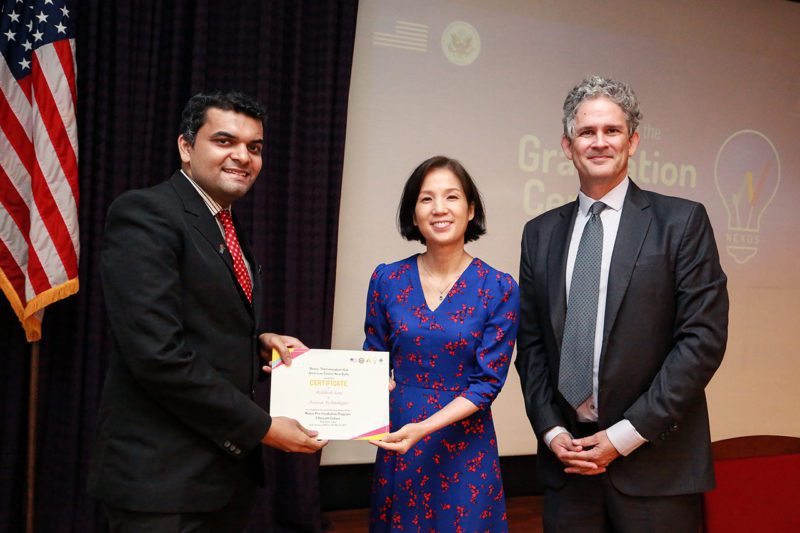
Aumsat CEO Riddhish Soni at the Nexus Pre-Incubation Program graduation ceremony in New Delhi. Credit: Riddhish Soni, 2022.
Location: Rajasthan, India
Impact entrepreneur: Riddhish Soni, CEO
SDGs: Clean Water & Sanitation; Climate Action; Zero Hunger; Good Health & Well-Being; Gender Equality; Affordable & Clean Energy; Sustainable Cities & Communities; Life On Land
Problem: There is an enormous amount of potable water loss in India (40%), which affects health, safety, sanitation, and the economy. Policymakers, planners, and engineers don’t have reliable information about the variability of water quantity and water quality in drought-hit areas of India. Leak detection technologies are costly and inefficient as companies struggle to find leakages and conserve scarce resources. Many agencies don’t fix a leak until it is visible and reported.
Solution: Aumsat provides precision-driven, AI-enabled, satellite-based hydronalytics for detecting, predicting, and forecasting leakages in water pipeline networks. Unlike traditional survey methods and SCADA-based systems, their Structural Equation Modeling (SEM) Neural Network derives data from satellites, drone imagery and sensor networks to help public utilities and irrigation departments accurately detect, analyze, and forecast water leakages, ruptures, spills in water transmission networks without physically being present in the field.
You can find Aumsat on their website and LinkedIn.
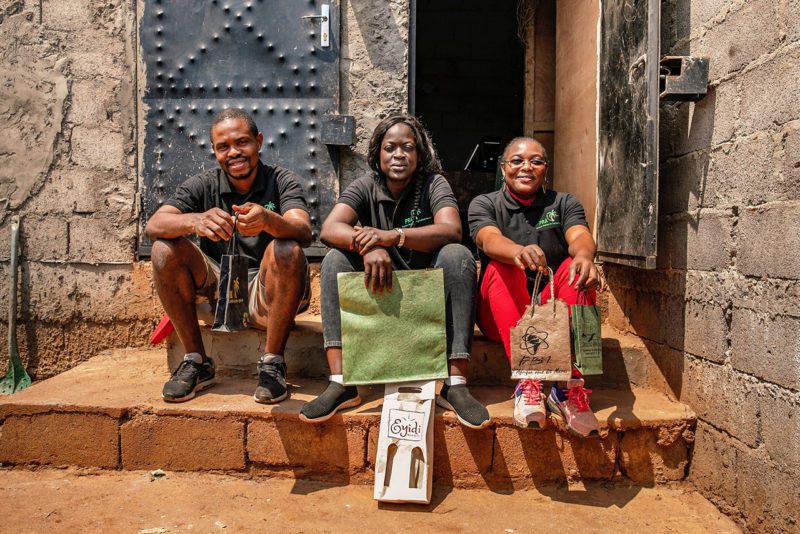
The PRA team showcasing a sample of their products in their Yaoundé headquarters. Credit: Armelle Sidje Tamo, 2021.
Location: Rural Cameroon
Impact entrepreneur: Armelle Sidje Tamo, Founder
SDGs: Climate Action; Gender Equality; Decent Work & Economic Growth; Reduced Inequalities; Sustainable Cities & Communities; Responsible Consumption & Production
Problem: Despite the existence of alternative, more eco-friendly materials, paper and plastic are still heavily used in a wide variety of sectors. Each year, Cameroon produces 600K tons of plastic waste which destroys 200K hectares of its plant cover. Each year, Africa produces 5 million tons of paper and only 4% is recycled. Every 8 months, after plantain harvests in Cameroon, the trunks are cut, abandoned in fields, and begin to rot, which emits methane (25x more toxic than CO₂).
Solution: PRA recovers existing paper waste, transforms plantain banana stems, and combines the two to create a new, biodegradable packaging to be used in the agro-food industry, supermarkets, bakeries, wine cellars, the clothing industry, and more. They plan to use the excess bio-waste to produce organic fertilizer and biogas for local farms in the coming years. Rural women will be the ones collecting plantain trunks and processing them into fiber.
You can find PRA on their website and LinkedIn.
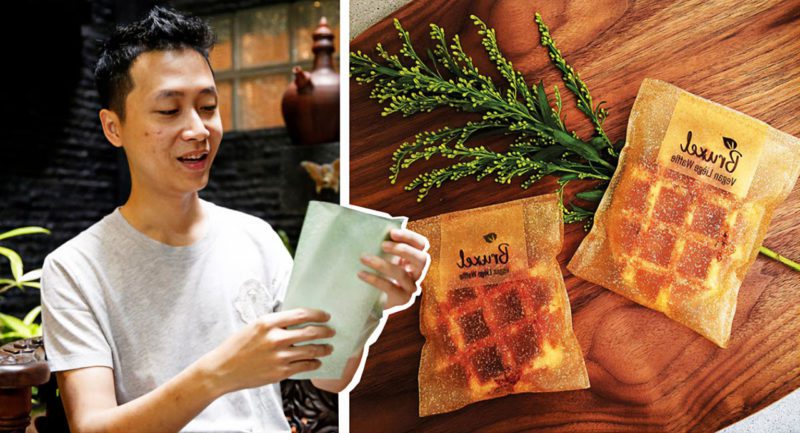
A sample of Evoware’s seaweed-based packaging. Credit: Evoware website, retrieved 2022.
Location: Indonesia
Impact entrepreneur: Dominika Veridianti, Research & Development
SDGs: Climate Action; Industry, Innovation, and Infrastructure; Life Below Water
Problem: Most plastics we use today are non–biodegradable fossil-based polymers, which are devastating to the environment. Some conventional plastic is recyclable, but the process is still occasional, complex, and expensive.
Solution: Through the chemical and biological mapping of Indonesia seaweed species and integrated 3D farming, Evoware produces seaweed-based bioplastic pellets with a fully circular, scalable business model, providing an excellent alternative material to fossil-based plastic pellets. Their efficient 3D system will be able to maintain the growth of seaweed species and create zero disruption to its natural ecosystem while increasing the farmer’s commodities for other sea products. The seaweed bio-pellets are molded using existing plastic machinery into various products alternative to single-use plastic products in the current market. They are fully degradable and compostable.
You can find Evoware on their website and LinkedIn.
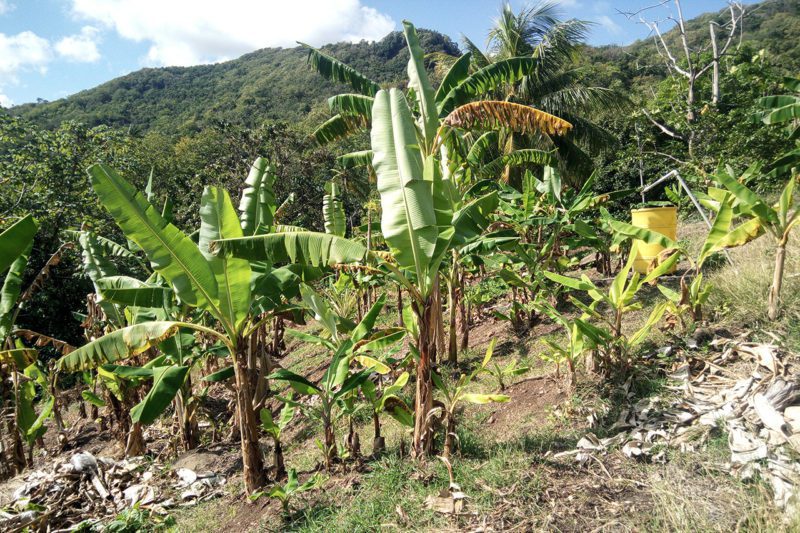
The MicroFarm team is currently focused on infrastructure development in order to scale production. Credit: Jimmy J. Clavier, 2022.
Location: Saint Lucia (Caribbean island)
Impact entrepreneur: Jimmy J. Clavier; CEO, Business Development & Marketing
SDGs: Climate Action; Clean Water & Sanitation; Zero Hunger; Good Health & Well-Being; Gender Equality; Affordable & Clean Energy; Industry, Innovation, and Infrastructure; Sustainable Cities & Communities; Life On Land
Problem: Saint Lucia’s rural populations, which are for the most part living in poverty, commonly depend on traditional biomass for cooking and heating, due to a lack of infrastructure and access to commercial energy. The domestic burn of biomass, organic waste, and animal manure is inefficient and releases large amounts of particulates and gasses that warm the Earth. It can also cause respiratory problems in humans. However, biodegradable wastes can be taken to Aero Digester plants and transformed into biogas, a much more eco-friendly source of renewable heat and energy for local use. Although Saint Lucia has good resources and ideal climatic conditions for generation of biogas, the technology has not really taken off in the country.
Solution: The MicroFarm is a small yet scalable, high-production farm that uses regenerative agricultural practices to increase food security locally, prevent waste, and improve Saint Lucia’s carbon footprint, among other positive outcomes. Their unique balloon biogas digester, which will be implemented at the MicroFarm and will be replicated elsewhere on the island after the pilot stage, has the potential to generate considerable environmental, health, and social benefits with a net positive impact on clean energy. The farm has a strong community focus and aims to hire unemployed and disadvantaged youths.
MicroFarm does not yet have a digital presence.
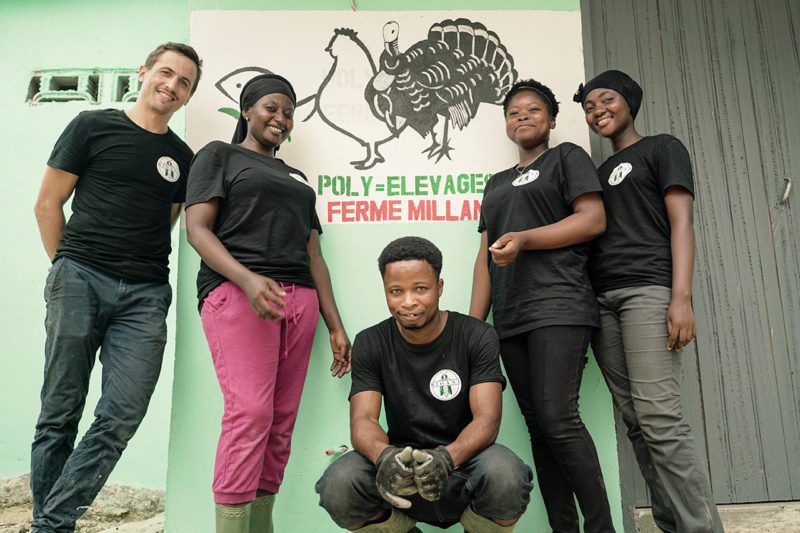
Some of the BioAni team at their black soldier fly larvae farm in Aboisso, Côte d’Ivoire. Credit: Amaury Gaschignard, 2022.
Location: Côte d’Ivoire
Impact entrepreneur: Amaury Gaschignard, CFO
SDGs: Climate Action; No Poverty; Good Health & Well-Being; Decent Work & Economic Growth; Responsible Consumption & Production; Life Below Water
Problem: The fisheries sector employs more than 400,000 people in Côte d’Ivoire and represents both an import and an export for the country. In 2022, the Ivorian government committed to a tenfold increase in fish production by 2025. However, conventional fishmeal, the food fed to these farmed fish, is made of wild-caught fish, bycatch, and fish by-products, which is threatening the maritime food chain (1 kg of fishmeal requires 4 kg of wild fish). And 80% of the fish actually consumed in Côte d’Ivoire is imported.
Solution: BioAni produces animal feed and fishmeal made from black soldier fly larvae, fed from locally collected bio-waste and natural fertilizer. This specific type of larvae is high in protein, reproduces quickly, and can come in many forms (live or frozen, dehydrated, concentrates, granules, oil, and more). 40% of the waste ingested by the larvae is transformed into natural fertilizer and the remaining 60% into proteins. The production is local, immediate, and low-cost, therefore resilient to economic and environmental shocks.
You can find BioAni on LinkedIn.
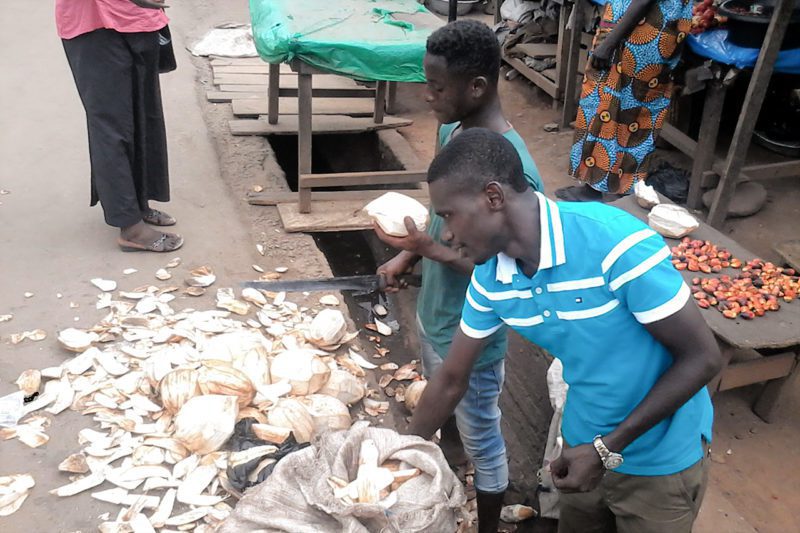
Part of the Ecovon team breaking up coconuts to retrieve the husks. Credit: Ecovon website, retrieved 2022.
Location: Ghana
Impact entrepreneur: Isaac Brenya, CEO
SDGs: Climate Action; Industry, Innovation, and Infrastructure; Sustainable Cities & Communities; Responsible Consumption & Production
Problem: Conventional engineered wood used for construction today is created using additives and heavy chemicals in order to be durable and flame retardant (e.g. formaldehyde, used as synthetic binder in wood-based panel boards, has been recognized by the WHO as a human carcinogen). Even within the “green” building industry, there currently exists no naturally flame retardant paneling board made from 100% natural bio-based fibers without added binders. Additionally, the rate of deforestation in Ghana is estimated to be one of the highest in the world (at an estimated annual rate of 2%, equivalent to 135,000 hectares per year). Ghana generates over 750,000 tons of coconut husks yearly, but no proper usage has yet been found.
Solution: Ecovon has developed a sustainably sourced, newly engineered, renewable wood made from coconut husk and sugar cane bagasse, supplying the global market with a formaldehyde-free bio-based wood alternative that is better for people and the planet. The wood product is naturally flame retardant and anti-fungal and binds using the natural lignin content from the plants. It is 100% compostable, durable, cheaper to make, and reduces Ghana’s carbon footprint while enriching the lives of local coconut and sugarcane producers.
You can find Ecovon on their website and LinkedIn.
Two of these six climate-focused startups will be awarded a microgrant and early-stage support on Friday, May 13th, during the Stardust Startups Spring Givenar for Climate Action. Meet the finalists, see the winners’ reactions, listen to some exciting guests speak about the importance of climate and water, and learn more about how you can get involved.
Date: Friday, May 13th, 2022
Time: 2 – 3:30 PM ET / 8 – 9:30 PM CET
Place: Online. Save this Zoom link in your calendar to join on Friday: https://tinyurl.com/2022-givenar
Related Content
Comments
Deep Dives
RECENT
Editor's Picks
Webinars
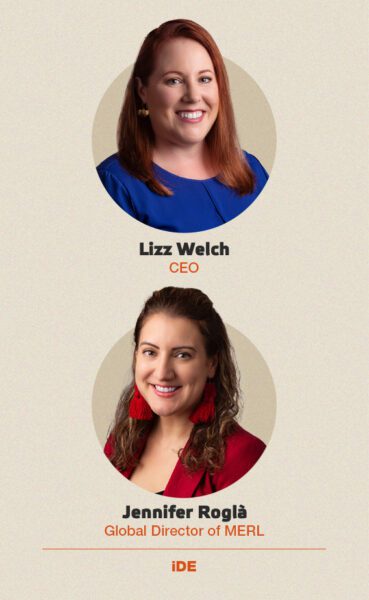
Featuring
Lizz Welch & Jennifer Roglà
iDE
May 16 - 12:00 PM EST
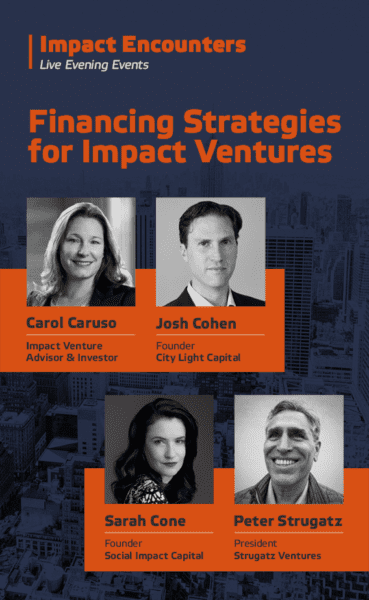
Impact Encounters
May 22 - 6:30 PM EST
News & Events
Subscribe to our newsletter to receive updates about new Magazine content and upcoming webinars, deep dives, and events.
Become a Premium Member to access the full library of webinars and deep dives, exclusive membership portal, member directory, message board, and curated live chats.
0 Comments